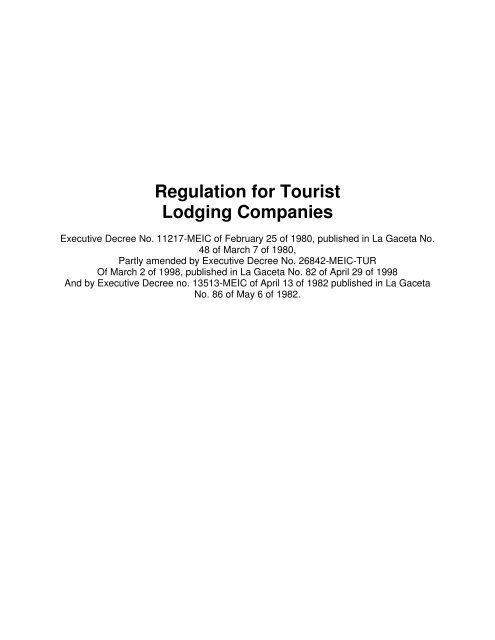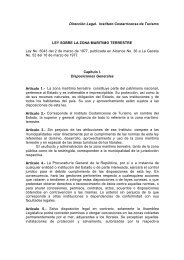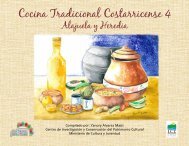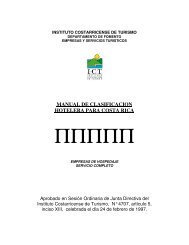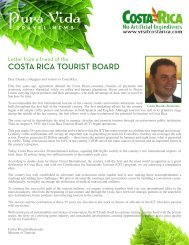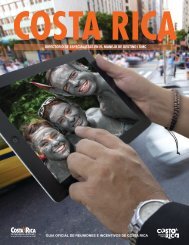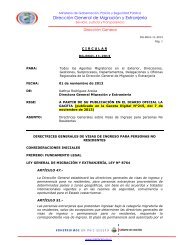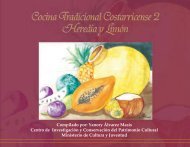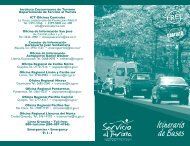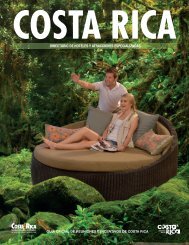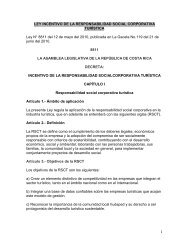Regulation for Tourist Lodging Companies - Costa Rica
Regulation for Tourist Lodging Companies - Costa Rica
Regulation for Tourist Lodging Companies - Costa Rica
You also want an ePaper? Increase the reach of your titles
YUMPU automatically turns print PDFs into web optimized ePapers that Google loves.
<strong>Regulation</strong> <strong>for</strong> <strong>Tourist</strong><strong>Lodging</strong> <strong>Companies</strong>Executive Decree No. 11217-MEIC of February 25 of 1980, published in La Gaceta No.48 of March 7 of 1980,Partly amended by Executive Decree No. 26842-MEIC-TUROf March 2 of 1998, published in La Gaceta No. 82 of April 29 of 1998And by Executive Decree no. 13513-MEIC of April 13 of 1982 published in La GacetaNo. 86 of May 6 of 1982.
<strong>Regulation</strong> <strong>for</strong> <strong>Tourist</strong> <strong>Lodging</strong> <strong>Companies</strong>Executive Decree No. 11217-MEIC of February 25 of 1980, published in La Gaceta No.48 of March 7 of 1980,Partly amended by Executive Decree No. 26842-MEIC-TUROf March 2 of 1998, published in La Gaceta No. 82 of April 29 of 1998And by Executive Decree no. 13513-MEIC of April 13 of 1982 published in La GacetaNo. 86 of May 6 of 1982.63CHAPTER IGeneral DispositionsArticle 1.-The following norms will rule the functioning of tourist lodging companies inthe country, as well as their classification by types and classes.Article 2.-<strong>Tourist</strong> lodging companies are those permanently dedicated to offercomplementary services or without them, and that are classified within the categoriesestablished here. 53Article 3.-The main types of lodging companies are:1º- Group of Hotel <strong>Companies</strong>:a) Hotelsb) Residential Hotelsc) Hotels with apartment facilitiesd) Condo hotels 54e) <strong>Tourist</strong> motelsf) Time-share hotelsg) Botels2º- Group of hotel-related companiesa)Pensionsb)Guest houses3º- Hostels groupa)Youth hostelsb)Fishing groundsc)Mountain lodgesd)Country lodges4º- Camping Group5º- <strong>Tourist</strong> Housing Group63 As amended by Executive Decree No. 26842-MEIC-Tur of March 2 of 1998 published in La Gaceta No. 82 ofApril 29 of 1982.54. Clauses d), f,) and h) added by Executive Decree No. 13513-MEIC of April 13 of 1982
a)Cabinsb) Apartmentsc) Huts6- Group of not-classified establishmentsArticle 4.-For tourist protection effects lodging establishments must use correctly adenomination describing their company, as follows: 55a)Hotel: Type of establishment with at least twenty rooms or more, according to thecategory that corresponds, offers lodging service <strong>for</strong> a daily fee, as well as board, at theclient’s choice. There must be a functional integrity between the lodging andcomplementary services.b)Residential Hotel: Hotel that does not offer board.c)<strong>Tourist</strong> motel: Type 64 of hotel establishment that offers lodging service <strong>for</strong> a dailyfee and has the following characteristics:a) Offers travelers parking lot <strong>for</strong> their automobiles within the establishment itself.b) Located preferably outside of urban area and near to public roads.c) Have at least five rooms, all with private bathroom, and independent entrancefrom outside.d) Building does not exceed two levels, and indicates if there are vacancies,outside of the same, with luminous signs allowing its easy reading from the road,day or night,.d)Hotel with apartment facilities: (Apartments – hotel): Type of establishmentoffering lodging service <strong>for</strong> a daily fee and has the following characteristics:a) Constituted by apartment type units, each one with one or more bedrooms,private bathroom, living room, dining room and kitchen.b) Occupies a building or part of the building, totally independent of it, and itsdependencies constitute a homogenous whole, with entrances <strong>for</strong> the exclusive useof the establishment.c) Includes floor service in the feed) Has a parking lot <strong>for</strong> the guests’ vehicles.e)Pension: Small type of establishment, normally managed by a family, with aminimum capacity of three rooms, and offers board in the complete pension version, orhalf pension, in one sole fee.f)Guesthouse: Type of establishment similar to the pension not offering board.g)<strong>Tourist</strong> housing: (cabin, cottage, summerhouse, etc.) This kind of establishmentgives lodging service <strong>for</strong> a daily or monthly fee, with units <strong>for</strong>ming independent55. Article 4, first paragraph, clauses a) and J9 were thus amended by Executive Decree No. 26842-MEIC-TUR ofMarch 2 of 1998, including clause l).
housings, with one or more bedrooms, private bathroom, kitchen, independent entrancefrom outside, and parking lot <strong>for</strong> guests’ vehicles.h)Hostels: Type of rustic, com<strong>for</strong>table establishment offering lodging service tosports people or groups united by a common interest or activity. There are differentmodalities among them, mountain refuges, lodges, fishing camps, beach, country oryouth lodges, whose characteristics and additional services vary according to theirspecialization, and depending on it, they receive their name.i)Camp sites: Type of establishment offering rental services <strong>for</strong> a daily or monthlyfee, of an area of land duly conditioned and marked to facilitate outdoor living, wheresleeping is done in tents, or in trailers.j)Condo hotel: A modality of lodging operation in which the building’s ownership isprotected by the Law of Horizontal Property, No. 3670 of March 22 of 1966 or appliesprinciples of it, and in which the hotel’s business development is guaranteed by acontract of management with a hotel operator company that assumes the functions thatcorrespond to the managers, according to the law; and those functions derived from thetypical hotel-related characteristics of the operation. Seventy per cent of the time of theyear, the establishment must be dedicated to the lodging service, and the remainingthirty per cent it may be used by the joint owners. 56k)Botel: Hotel establishment located in a floating facility or a passengers ship,permanently or temporarily immobilized to carry out these functions. 57l)Time share: system or regimen by which a person purchases the right to use,enjoy or any other right relating to the use of a holiday accommodation unit, <strong>for</strong> aspecified or specifiable period of each year, during the validity of the respectivecontract, on payment of certain global price.Article 5.-<strong>Tourist</strong> lodging companies will be classified as follows:a)Luxuryb)First class A 65c)First class Bd)Second Classe)Third ClassFor its better identification and abbreviation, ICT and companies may use theterminology and symbolization of stars, in descending numerical order, from five <strong>for</strong>luxury to one <strong>for</strong> third class.56. Tacitly amended by articles 5 and 6 of the Law <strong>for</strong> Promotion of the Effective Defense and Competition ofConsumer No. 7472 according to which the Government may regulate prices of goods and services, only inexceptional situations and temporarily.57. Thus re<strong>for</strong>med by Executive Decree No. 13513-MEIC of April 13 of 1982.
Article 6.-For each type of lodging company will apply the following categories:a)Hotels: From luxury to third class or from 5 to 1 stars.b)Hotel with apartment facilities: From first to third or from 3 to 1 stars.c)Residential Hotels: From first to third or from 3 to 1 stars.d)Pensions: From second to third or from 2 to 1 stars.e)Guesthouses: From second to third or from 2 to 1 stars.f) Hostels: From first to third or from 3 to 1 stars.g)Camp sites: From first to third or from 3 to 1 stars.h)<strong>Tourist</strong> housing: From first to third or from 3 to 1 stars.Article 7.-The <strong>Costa</strong> <strong>Rica</strong>n <strong>Tourist</strong> Board, by firm agreement of its Board of Directors,will approve a manual of specific requirements <strong>for</strong> each type and category, which will beconsidered an integral part of this <strong>Regulation</strong>. 58Article 8.-<strong>Companies</strong> not having the minimum conditions 66 to qualify as tourist, may notclassify, and its functioning will be the exclusive responsibility of the police and healthauthorities. Establishments renting rooms without a register of guests won’t be classifiedeither.Article 9.-When an establishment occupies a building with particular traditionalconditions or of architectural value, they may be submitted to the judgment of the Boardof Directors of the <strong>Costa</strong> <strong>Rica</strong> <strong>Tourist</strong> Board, in order to be classified in one category,even if not complying with some of the functioning requirements of modernestablishments.Article 10.-Existing tourist lodging companies will have a term of ninety calendar days,counting from the validity of this <strong>Regulation</strong>, to request a classification within the typeand category that corresponds.New projects or establishments will necessarily obtain a classification as priorrequirement to opening.Article 11.-The <strong>Costa</strong> <strong>Rica</strong>n <strong>Tourist</strong> Board may officially classify a company not havingpresented classification request within the established term in the above article, and ifnew, <strong>for</strong> not having presented it at any moment.It may also reclassify a company in an inferior category than the one it had, if it hasstopped complying with the minimum requirements necessary to belong in a specificclass, or if repeatedly not complying with standing regulations, particularly ExecutiveDecree number 9387 of November 7 of 1978 59 (<strong>Regulation</strong> <strong>for</strong> Tourism <strong>Companies</strong> andActivities) and the present article.58. The last paragraph of this article was annulled by Executive Decree No. 26842-MEICTUR of March 2 of 1998.59. This regulation was modified by Executive Decree No. 25226-MEIC-TUR of June 21 of 1996.60. Clauses d), e); f) and g) of the present article have been added by Executive Decree No. 26842-MEIC-TUR ofMarch2 of 1998.
Article 12.-All tourist lodging establishments will be subject to complying the laws andregulations ruling their activity, and will also have the following general obligations: 60a) Strictly comply with hygiene and maintenance norms established by the Ministryof Health.b) Keep a register of guests, according to the instructions given by the <strong>Costa</strong> <strong>Rica</strong>n<strong>Tourist</strong> Board –ICT- and the Migration Department of the Ministry of Government.c) Offer to the <strong>Costa</strong> <strong>Rica</strong>n <strong>Tourist</strong> Board –ICT- statistical data to its request.d)Offer goods and services, in the nature and quality of the class held by theestablishment.e)Guarantee safety, tranquility and personal intimacy of the guest.f)Offer truthful, prior and complete in<strong>for</strong>mation of the services offered.g)Respect the rights of tourists as consumers according to the existing generalnormative.CHAPTER IIOf the contract of <strong>Tourist</strong> <strong>Lodging</strong>Article 13.-The tourist lodging contract, as a modality of the indenture of lease, isregulated as applicable by what’s disposed in the Civil and Procedural Law, and isimproved the moment the company accepts a person to register as guest.Article 14.-For a reservation to be valid, it must be confirmed in writing and it isconsidered a promise of tourist lodging contract, subject to compliance of the contract’srequirements. Along with the request <strong>for</strong> reservation, companies may demandanticipated payment of part of the amount to be paid.Article 15.-Except <strong>for</strong> a different agreement between the parties, or a company policyagainst it, the down payment referred to in the precedent article will be equivalent to aone-day’s fee, if the reservation is <strong>for</strong> less than ten days occupation, and the equivalentof a one day’s fee <strong>for</strong> the first ten days, and one more <strong>for</strong> each additional five days, ifthe reservation were <strong>for</strong> more than ten days.Article 16.-In case of individual reservations, the cancellation of reservations may bedone without the company having the right <strong>for</strong> an indemnification or retaining ofanticipated payment, if done in writing and at least <strong>for</strong>ty-eight hours anticipation of thefixed date <strong>for</strong> arrival. If the reservation is not canceled in such term, the company mayonly have the right to retain as indemnification, the equivalent of one day’s fee oflodging. 61Article 17.-Assuming collective reservations, cancellation of the reservations will beruled by express agreement established between the parties of the lodging contract. 62Article 18.-When the company, due to over booking or others of <strong>for</strong>ce majeure, couldnot comply with a reservation <strong>for</strong> the accepted date, it must provide the lodging of theguest in another establishment of similar quality and price, and must assume the
transfer expenses of the guest to the other establishment, and the payment of anyexistent difference in the prices.Article 19.-The guest acquires, by being admitted as such, the following rights:a) Use and enjoyment of rooms or areas assigned, during the validity of the contract.b) Access and right to use of complementary services of the establishment andpublic areas of the same, subject to the particular regulations of them.Article 20.- At the moment of <strong>for</strong>malization of the tourist-lodging contract, the guestacquires the following obligations:a) To pay the agreed price at the moment required <strong>for</strong> it by the company.b) Return the room in the same condition it was received, except <strong>for</strong> any losses ordamages that were not product of his fault, negligence or lack of prudence.c) Use the room, facilities and furniture <strong>for</strong> the use it was destined <strong>for</strong>. Abusive useof them gives the company the right to unilaterally rescind the contract andindemnification of damages.Article 21.-By abusive use will be understood the non-compliance of the followingprohibitions:a)Cook, wash or iron within the room, bring animals to them, or receive nonregisteredpersons without authorization of the company.b)Keep inflammable matters, explosives, corrosives, drugs or any other kind ofsubstances within the premises or room, that in any way expose the goods of thecompany to damage, or the safety or life of others.Article 22.-Unless otherwise expressly agreed between the parties, the lodgingagreement is considered celebrated <strong>for</strong> one day. In case the guest does not leave theroom, it is tacitly considered extended <strong>for</strong> one more day, and so successively.The company must warn the guest in writing and with at least one-day anticipation or atthe moment of registering as guest, the maximum time he can occupy the room, in caseof having it reserved <strong>for</strong> an immediate date <strong>for</strong> another guest.Article 23.-If the guest refuses to leave the room when he should do, by canceling thecontract, <strong>for</strong> the term of the same or <strong>for</strong> any other reason, the company may recur to thecorresponding authorities so that without any other <strong>for</strong>malities, proceeds to dislodgeaccording to what is established in article 255 of the Procedural Civil Code. In this caseit will be proceeded to place the luggage in a storeroom or other safe place, previouslydrawing up a summary to be signed by the authority along with the manager of the hotelor his assistant. 63Article 24.- For lodging prices’ effects, the time of entrance and departure of theestablishment will be previously fixed by the manager, between twelve and fourteenhours, not existing between one and the other a difference greater than two hours. 64
Article 25.-<strong>Lodging</strong> of children less than two years old, in the same room with hisparents or attendants, is free of charge, in the understanding that no additional bed orcradle is used <strong>for</strong> the minor. For children under twelve years and older than two years,also in the same room than their parents or attendants, a 50% of the establishedauthorized fee is to be charged.Article 26.-While not canceling the account, the company has the right to object to theguest taking out his luggage from the establishment, in accordance to what is disposedin article 1143 of the Civil Code.Article 27.-The company is not responsible <strong>for</strong> losses or damages affecting the valuesor goods of the guests, except in the following cases:a) If they are jewels or values, when deposited in the safety boxes of theestablishment, and the guest has declared be<strong>for</strong>e the manager the amount or contentsof what was deposited.b) If wardrobe or other luggage, if proven negligence of the company, as refers tonecessary and reasonable safety.Article 28.-For internal regulation or particular norms of each company, to be valid asthey concern the guests, they must be approved by ICT, and published be it individuallyor generally, with letters or signs placed in a visible place of the establishment.Article 29.- In <strong>for</strong>ce from its publication.Given at the Presidential House.-San José, at day twenty-five of the month of Februaryof nineteen eighty.RODRIGO CARAZOThe Minister of Economy, Industry and Commerce,FERNANDO ALTMANN ORTIZ


